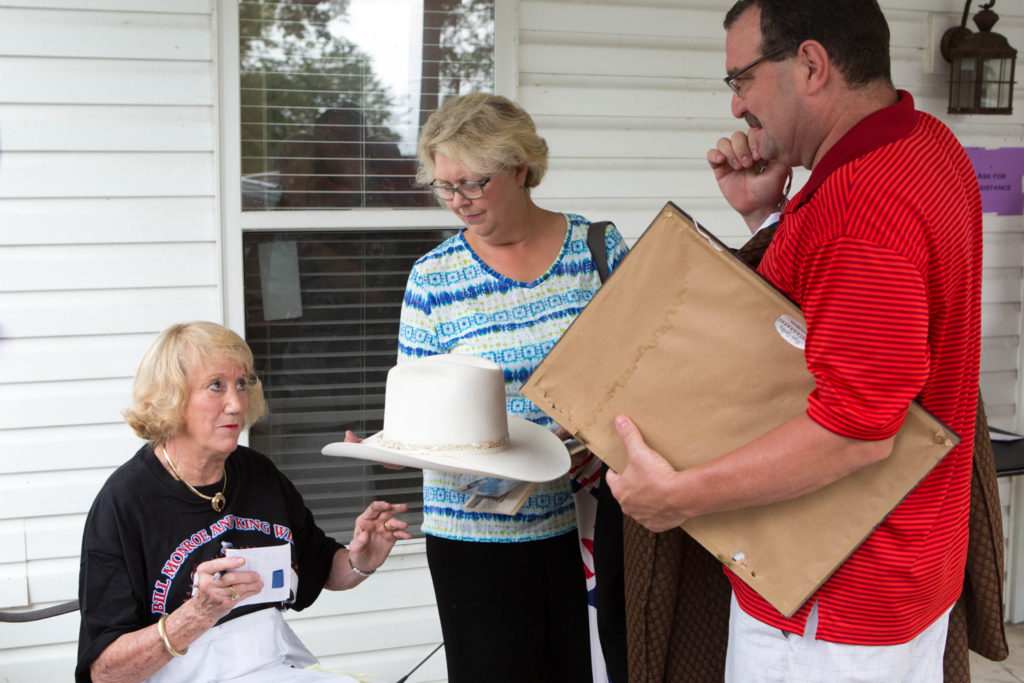
Bill Monroe is the undisputed father of bluegrass. And as the patriarch of a passionate musical family, artifacts from his rise to prominence are in high demand. This weekend, 20 years after his death, the Monroe family is cleaning out the closets.
Some of the relics from Bill Monroe’s life have become almost priceless, like his Gibson mandolin. It was basically the only one he ever played. It famously sold for a million dollars. But that’s
at the Country Music Hall of Fame, not at the Monroe family studio in Gallatin — site of the
estate sale that runs through Saturday.
As Monroe’s high lonesome sound rings out over a speaker, shoppers pick through items that are a little more garage-sale grade. Hannah Fitzpatrick snags some deer antlers, which she says will be “an accent piece.”
“And then I got this little shovel to pick up our dog’s poop,” she says. “Just kinda cool. I can say that this is Bill Monroe’s.”
Fitzpatrick says she’s not even that big of a bluegrass fan. But John Vaughn is. He works on music tours in Nashville, and he’s already wearing his leather jacket with fringe. He says he can feel its energy.
“I paid 200 bucks for it. So now all can do is pray for fall to get here so I can rock it every day,” he says.
Others throw down 10 bucks for a mandolin pick with a certificate of authenticity or a union card with Monroe’s signature from the American Federation of Musicians.
The signed portraits from Johnny Cash and Merle Haggard go quickly. There are collectors in the crowd like Roger Martin who simply resell items online. The minister from Huntsville says preparing for this sale to find possible investments has been an education in American music history. He says he now sees the musical family “tree” connected to Monroe.
“You’ve got all kinds of pieces in here autographed by any number of artists that admired him, people that actually learned from him, or he was a huge influence on,” Martin says. “Then you start learning all these other names, it’s pretty cool.”
What Stays, What Goes
Monroe rose from the humblest of beginnings in a tiny farming community in Western Kentucky. Bluegrass fans revere him like Elvis, but without all the glitz.
His heirs have already donated key pieces to museums, like suits and hats. And there was another estate sale shortly after Monroe’s death in 1996. But Jimbo Monroe, Bill’s grandson, says there is at least another warehouse worth.
“Of course all of the stuff means something to you,” he says. “But when you have such a large volume of stuff it gets to the point it’s like wow, it’s almost like taking care of a child because you have to make sure it doesn’t get wet, doesn’t get tore up.”
Still, the family is taking care of its most prized possessions. James Monroe, Jimbo’s father, says some materials will always stay in the family.
“A lot of his lyrics he wrote on paper, we’re keeping that kind of stuff,” he says. “Some of the pictures I have of my dad back in the 30s and 40s, I’ll keep those.”
Buyers shake hands with the Monroe decedents as they paw through little tchotchkes, vintage neckties, even gardening tools. But some things that could seem mundane have meaning.
Joe Lurgio of Nashville flips through old show contracts in protective plastic sleeves. He stops on one from 1982. A faded handwritten letter from Monroe notifies the venue that the show would be canceled.
“This is cool,” Lurgio says. “It makes people feel closer to — well I never met him — but somebody they really look up to and somebody that becomes that immortal at this point in time.”
In some ways, there is no one like Bill Monroe, says Mike Simpson, who is the board chair of the International Bluegrass Music Museum in Bowling Green, Kentucky.
“There’s very few people you can trace an original American art form back to,” Simpson says. “And for all intents and purposes, I think most every academician [and] musician traces this American art form to Bill Monroe.”
Simpson says he has an “infatuation,” especially since he’s from the same hometown of
Rosine, Kentucky. He already has an old church pew that sat on Bill Monroe’s porch. And on Thursday, heading to his car in the rain, his arms are full after dropping $6,000.
“That’s why I’ve got to go to work,” he says with a laugh. “I’ve gotta go make some money.”
Correction: The original post mis-identfied Mike Simpson as with the International Bluegrass Music Association instead of the International Bluegrass Music Museum, which is a separate organization.


